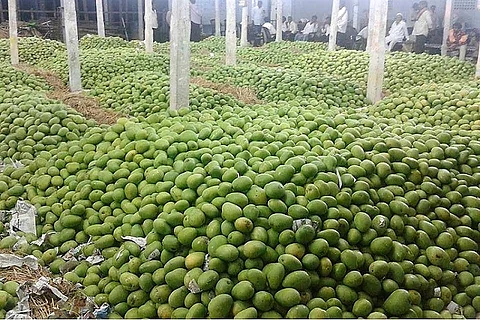

Officials in Andhra Pradesh carried out raids in several fruit markets in Guntur district on Tuesday and seized over 1,000 sachets of ethylene powder that were being used to artificially ripen mangoes.
The Food Safety Department along with the Vigilance and Enforcement Department, reportedly found that 22 tons of mangoes were ripened with the use of ethylene.
"1,080 ethylene sachets were found during the inspections and each sachet contained five grams of the chemical product. The collected samples would be sent to the forensic laboratory for analysis and action would be taken against the traders," Vigilance CI S Anthony Raj told reporters.
While the state government provides the farmers and traders with ethylene chambers in large markets, where they can ripen their fruits in a less harmful way, the sachets are far more harmful as the traders often do not regulate the quantity of the gas being released.
Farmers and traders often complain that the capacity of the chamber is inadequate, compared to the amount of fruits coming into the market.
The officials also reportedly found a few sachets of calcium carbide mixed with the ethylene powder.
Calcium Carbide, a dangerous and corrosive chemical, is used to make fertilizers and is known to have carcinogenic properties. It can also cause digestive problems.
Despite this, it is still widely used to ripen mangoes quickly. Farmers tend to pluck mangoes early as they need to be transported to the market before they get spoiled.
Once it is in the market, mango traders ripen them artificially to clear their stocks sooner. Moreover, the fruits look more attractive when they are artificially ripened garnering more consumers.
However, the substance may cause cancer, permanent eye damage, ulcers and even lung issues.
Moreover, artificial ripening of fruits is banned under the Food Safety and Standards Act (FSSA), 2006.